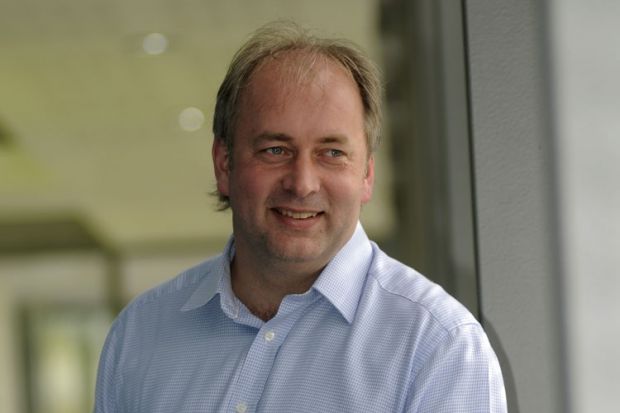“I am the first Regius professor for computer science. That’s a nice thing to be able to say,” said Nick Jennings, who has been appointed to the post at the University of Southampton.
“Preparing for my interview, you look back at some of the older [Regius professorships] that started in 1540 or whatever and you think: well, in 100-200 years’ time when people look at whatever Wikipedia becomes, they’ll see the first Regius professor of computer science was me, and I think that’s quite cool.”
Professor Jennings, who assumed the role at the beginning of March, said that the benefits of having the title were numerous. “I’m really pleased that there is now a computer science professor. Obviously, when [Regius professorships] started, computing wasn’t around.”
A dozen new Regius posts were created to mark the Queen’s Diamond Jubilee in 2012, but before that only two new Regius professorships had been created in the past hundred years. Most Regius professorships are in “quite traditional areas, so it’s great that there actually is one in the field, full stop”.
“It gives you a platform to amplify and talk about the field on a broader stage. I could do it as Nick Jennings, professor of computer science at the University of Southampton – that’s fine; that will gain some visibility. Or I could do it as Nick Jennings, the Regius professor of computer science at Southampton. It adds more cachet to it,” he said.
Groundbreaking developments such as the internet, humans’ increasing technological interconnectedness and the creation of “ever more data produced by lots of different means” are forcing businesses and governments to recognise the field’s importance and to acknowledge that “manually processing this is just not going to happen”.
“You really need the computers to be much smarter,” Professor Jennings said. “I think [artificial intelligence] is now one of those natural technologies we need to be able to cope with [in] our modern everyday environment.”
As such, it was not surprising that Southampton – home to computer science pioneers Sir Tim Berners-Lee and Dame Wendy Hall – lobbied for the position so keenly, nor that Professor Jennings applied for it.
“One of the things Southampton was keen to recruit, which came through very strongly in the way they advertised the [position], was someone who was a research leader in their field, who would not just sit in a dark room on their own and produce fantastic stuff,” he said.
“The aim is to produce fantastic stuff but also [to] get out there and lead research teams. I’ve always been keen to see the research I do used by people and companies. I intend to carry on showing the value that computer science research can have for the economy and organisations.”
Log on: other computer science jobs
Heriot-Watt University
Heriot-Watt University is looking for a head of the School of Mathematical and Computer Sciences.
Closing date for applications: 11 April 2014
View the full job description and apply for this roles
Queen Mary University of London
Queen Mary University of London is seeking to appoint a postdoctoral research assistant – electronic engineering and computer science.
Closing date for applications: 7 April 2014
View the full job description and apply for this roles
University of Exeter
The University of Exeter is searching for a lecturer in computer science (education and research).
Closing date for applications: 21 April 2014
View the full job description and apply for this role
Appointments
Lesly Huxley has been appointed full-time director for membership and organisational development at the Leadership Foundation for Higher Education. She begins her role on 1 April.
Cardiff University has made Christopher Tweed the new head of its Welsh School of Architecture.
Stuart Elborn has been appointed the new dean of the School of Medicine, Dentistry and Biomedical Sciences at Queen’s University Belfast. Currently professor of respiratory medicine at Queen’s and consultant physician in the Belfast Health and Social Care Trust, he will take up post with immediate effect.
A University of Huddersfield academic has received international recognition for designing a device that could save hundreds of thousands of lives. David Swann, reader in design and subject area leader for product design and interior design, won the 2013-2014 World Design Impact Prize from the International Council of Societies of Industrial Design for his ABC Syringe, which changes colour to deter harmful reuse.
The University of Cumbria has appointed Euan Cartwright its new chairman of the university board. He previously served as vice-chair of the board from 2007 until 2012.
Sam Grogan, currently director of higher education at the Liverpool Institute for Performing Arts, has been appointed dean of students at the University of Salford. He takes up his position in May.
Nishan Canagarajah, dean of the Faculty of Engineering at the University of Bristol, has been appointed one of its pro vice-chancellors. His area of special responsibility will be research and enterprise.
Register to continue
Why register?
- Registration is free and only takes a moment
- Once registered, you can read 3 articles a month
- Sign up for our newsletter
Subscribe
Or subscribe for unlimited access to:
- Unlimited access to news, views, insights & reviews
- Digital editions
- Digital access to THE’s university and college rankings analysis
Already registered or a current subscriber? Login

